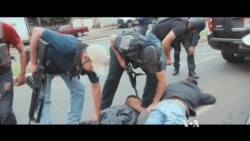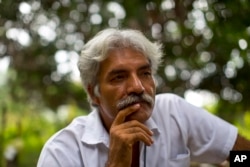Matthew Heineman’s documentary Cartel Land is made of the stuff we watch in Western movies. Only, this narrative is for real.
Two vigilante groups, one on the American side of the Arizona border, the other in Mexico, fight a common enemy: drug cartels.
Is their war a righteous one? Matthew Heineman, who was embedded with both groups to film the documentary, offers a first-hand account.
In the middle of the night, methamphetamine cooks get to work in the desert in the western Mexican state of Michoacan.
They roll out huge barrels and containers and start the process. Like businessmen, they brag about the quality of their product, their high productivity. They credit two American chemists, a father and son, for their training.
No, this is not a scene from the wildly popular American TV drama series Breaking Bad. This is a real moment in Matthew Heineman's documentary Cartel Land. The young filmmaker risked his life to film this. He was blindfolded and driven to the scene.
“I couldn't see anything and so I was freaking out,” Heineman says. “I did not know what to do. The head chef, the head cook, the head of this operation started showing me around the process of cooking meth with this little flashlight, and with this little flashlight I ended up lighting the scene with.”
Heineman throws a light on the extreme violence of the cartels and the groups of vigilantes who have taken up arms in both Mexico and the United States to defend their communities from senseless violence and entrenched corruption.
“In Mexico,” says the filmmaker, “the violence is real: 80,000 people killed since 2007; 20,000-plus people disappeared since 2007.”
According to the documentary, Michoacan is the epicenter of this violence.
WATCH: Penelope Poulou's interview with director Matthew Heineman
The film showcases Dr. Jose Mireles, a local doctor and a larger-than-life character, who became the leader of the Autodefensas, a Mexican vigilante group trying to rid the state of the cartel.
Heineman puts us in the middle of shootouts he filmed. He says there were countless times when he felt in extreme danger.
“Obviously being in a shootout was quite dangerous,” he laughs. But he adds it was not the worst one.
He says the scariest moment for him was during an interview he did with a local young woman whose husband was chopped to pieces in front of her.
Heineman says, “To hear her describe these horrors and to think that human beings would do that to other people, that stuck with me way more than these other action moments.”
Heineman shows Michoacan communities as defiant, tired of the fear and the corruption lawlessness brings.
At some point the army, which he says is often in collusion with the cartels, comes to town to confiscate the weapons of the townsfolk.
Locals drive them out of town. An angry woman standing in front of a tank shouts at the soldiers “If this happened to you, you would be on our side.”
No change
But Heineman says so far, no one has been able to change the situation.
“On one hand, yes there is the lack of law, lack of government institutions in Mexico. On the other hand it is just basic economics. As long as there is demand for drugs in the States, there will be supply for drugs from Mexico and South America," he says.
On the other side of the border, in Arizona, Tim “Nailer” Foley, an army veteran with a weather-beaten face and striking blue eyes, has formed his own militia against the Mexican cartels.
“Back in the day, vigilante wasn't a bad thing," Foley says. "Say the bandits were riding into your town. The townspeople would all get together and defend their town.”
Dressed in paramilitary gear and carrying semiautomatic weapons, he and his group have taken it upon themselves to capture illegal immigrants and hand them over to U.S. government border patrols.
'There is no law'
“This is what I consider to be the wild, wild West," Foley says. "There is nothing down here, there is no law."
Heineman agrees.
“You look up on the hill sides and there are cartel scouts looking down on you. You listen to this scrambled radio traffic they have and you can hear the cartel talking about you. You can hear them pushing drugs through the valley,” he says.
Meanwhile, Heineman says U.S. border patrols feel undermanned, understaffed and underfunded.
He says both the U.S. government and the vigilantes feel locked in a sort of David and Goliath battle with the U.S. being David and the cartels Goliath.
Are vigilantes extremists and a potential threat to law and order, or a movement that helps fill a void left by the failure of legal authorities? He lets the audience decide.







